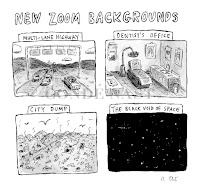I was in New York that fateful morning. A callow 45-year-old flush with the success of a mid-size five-year-old advertising agency, investing in our very own dot-com at what turned out to be the fag-end of the dot-com boom. It was an e-learning start-up, twenty years ahead of the Byju's of the world. We were in New York as the first leg of a coast-to-coast tour to potential customers of the e-learning engine we had developed. I was also looking forward to exploring tie-ups with a couple of Madison Avenue ad agencies whose bosses I knew. The founder of the e-learning set-up and I were staying in an upper Westside apartment of an excitable Bengali-American investor banker. The e-learning company contracted the banker and two other US-based Indians - a lawyer and a Silicon Valley techie - as business development partners for the US market.
The previous day, we met with a couple of dot-coms as potential white-label customers. Then, on the 12th, we met in Boston with the professor in charge of e-learning initiatives at Harvard.
I had scheduled a breakfast meeting with one of the two advertising agency bosses on the morning of the 11th.
The office was a few miles uptown from the World Trade Center. A half-hour or so into the meeting, Charlie's secretary interrupted the meeting, saying Charlie's daughter was on the line saying it was an emergency - a plane had crashed into one of the World Trade Center towers. Charlie didn't seem very perturbed. He told the secretary he would return his daughter's call later. Charlie explained to me that a mini plane had crashed into the tower piloted by a novice who probably had got his license due to connections a few years ago. He lamented America's rich-can-get-away-wth-anything culture and feared, being a staunch Democrat, that things would only get worse under Bush Jr.
We wrapped the meeting in 10 more minutes. As I took the elevator down from the 45th floor, I had no idea anything was amiss. However, as I hit the street, I saw a large crowd in front of a storefront transfixed by images on a large TV set in its display window.
I joined them and felt the first rumblings in my world, a seismic change that would reverberate over the next few years and shake up my world beyond recognition.
The next few days were a fuzzy mix of TV talking heads, the excitable Bengali's rantings suggesting that the US should immediately nuke Afghanistan and the lawyer's Trumpesque (in retrospect) conspiracy theories. I knew that not only was this business trip doomed, but we probably had made the wrong choice of business development partners.
I should have also realized that 9/11 would accelerate the fading out of the dot-com boom but, sadly, I didn't. So we returned home but continued investing in the e-learning venture, whose viability was entirely dependent on the US market as, those days, the Indian market for Internet-based ventures was extremely shallow.
A few more years and a few crores later, the e-learning venture went bust, with a critical reason being that we needed to recognize the end of the dot-com era in the US. The loss of capital combined with a scandal-driven bust of one of its key clients led to the nine-year-old until-then-successful ad agency going bust,
I resurrected a new life out of the ashes but never again joined the ranks of hot-shot successes. After a few years of painful readjustment, I found my angle of repose—the satisfaction of rewarding work without the accoutrements of fame or wild success, an interior quiet that gives me a broader perspective of the world.
9/11 shook my world, too. But after the first traumatic decade, the second one has been, personally for me, a decade of finding balance and peace.
Can we say the same for the world? The financial crash of 2008 and the subsequent decade of recovery and growth is a perspective that implies that.
If the world can contain the scourge of social media and inequality-driven tribalism, perhaps a third even greater decade fuelled by a revolution in biosciences and AI is to follow. Personally, as I look forward to going from being 65 years old to 75 years oldish, I look forward to my mind being AI-assisted and my body holding up well thanks to the coming miracles of cutting-edge bioscience.













